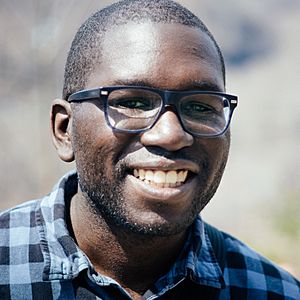Jamelle Bouie facts for kids
Quick facts for kids
Jamelle Bouie
|
|
|---|---|

Bouie in 2015
|
|
| Born |
Jamelle Antoine Bouie
April 12, 1987 Virginia Beach, Virginia, U.S.
|
| Education | University of Virginia (BA) |
| Occupation |
|
| Years active | 2010–present |
| Employer |
|
Jamelle Antoine Bouie (born April 12, 1987) is an American writer and journalist. He is a well-known columnist for The New York Times. Before that, he was a main political writer for Slate. Many people see him as an important voice on politics and social issues.
Contents
Early Life and Education
Jamelle Bouie grew up in Virginia Beach, Virginia. He finished high school in 2005. In 2009, he earned a degree from the University of Virginia. He studied political and social ideas there.
While in college, he started writing online. This made him interested in becoming a journalist. He used to live in Washington, D.C.. As of 2021, he lives in Charlottesville, Virginia.
Jamelle Bouie's Career Path
Jamelle Bouie started his writing career in 2010. He received a special writing award for The American Prospect. In 2012, he got another fellowship from The Nation.
Writing for Major Publications
In 2013, Bouie became a staff writer for The Daily Beast. He wrote about national politics for them. In 2014, he joined Slate as their chief political writer. He covered politics, government rules, and social issues.
Since 2019, he has been a columnist for The New York Times. He shares his opinions and analysis there.
Other Contributions and Appearances
Bouie helped write a book in 2013 about the 2012 election. It was called Barack Obama and the New America. Since 2015, he has been a political expert for CBS News. He often appears on their Sunday morning show, Face the Nation. He also helped cover the 2016 election night for the network.
Bouie writes articles about history, public policy, and national politics. He also enjoys writing about entertainment. This includes science fiction, comic books, and movies. He has even reviewed breakfast cereal for Serious Eats.
Focus on Social and Political Issues
Jamelle Bouie has written a lot about racial politics in the United States. He has covered topics like slavery in the United States and the American Civil War. He also wrote about important social justice events. His writings on these topics are often quoted by other journalists.
In 2019, The New York Times announced he would join their opinion section. They said he helps people understand politics better. He does this by looking at news like a reporter and a historian. His interests go beyond politics to art, food, and movies.
Hobbies and Other Work
Jamelle Bouie is also a talented photographer. In 2019, he had his first photo exhibition. It showed pictures of towns in Oklahoma. These towns were started by former slaves in the 1800s. He uses both digital and film cameras.
He co-hosts a podcast called Unclear and Present Danger. On this podcast, he and John Ganz talk about political thriller movies from the 1990s. They explore what these movies tell us about how the U.S. saw the world back then. He also uses TikTok, which is not common for opinion journalists from big news companies.
Awards and Recognition
In 2012, Jamelle Bouie was named one of The Root's Root Top 100. The website said he was a strong and important voice.
In 2015, Forbes included him in their "30 Under 30 – Media" list. They noted that he became a leading voice on the Ferguson story.
 | May Edward Chinn |
 | Rebecca Cole |
 | Alexa Canady |
 | Dorothy Lavinia Brown |

